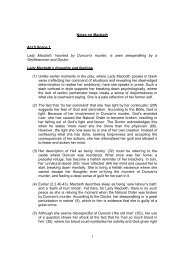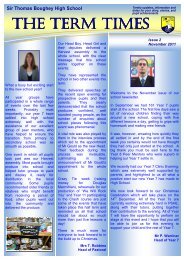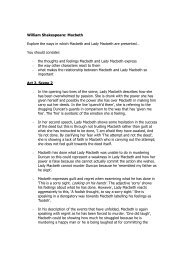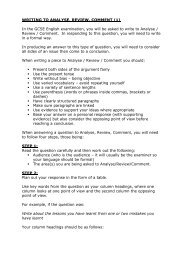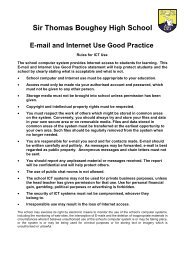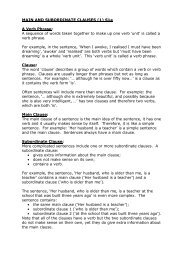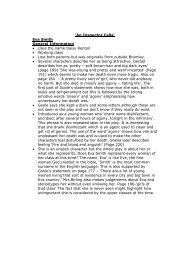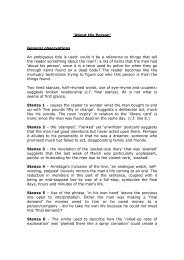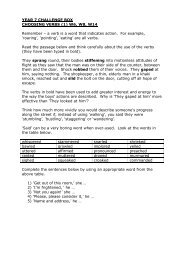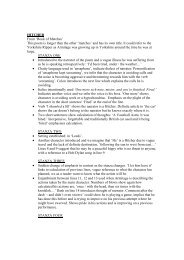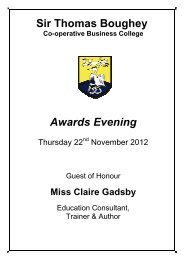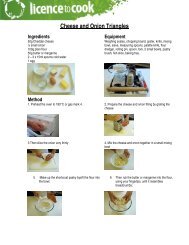Macbeth Act 3 Scene 4 Notes - Sir Thomas Boughey High School
Macbeth Act 3 Scene 4 Notes - Sir Thomas Boughey High School
Macbeth Act 3 Scene 4 Notes - Sir Thomas Boughey High School
Create successful ePaper yourself
Turn your PDF publications into a flip-book with our unique Google optimized e-Paper software.
<strong>Macbeth</strong> himself is a secret man of blood, and the bloody Ghost confronted him. His<br />
guilt was almost "brought forth" in front of his guests. None of this makes him feel<br />
remorse, or anything but a determination to see things through to the bitter end. He<br />
immediately starts thinking of what must be done next, and asks his wife what she<br />
thinks of the fact that Macduff has refused to come to their banquet. She asks if he has<br />
sent for Macduff, to get an explanation. He answers that he will send for him, and<br />
besides, "There's not a one of them but in his house / I keep a servant fee'd" (3.4130-<br />
131). A "servant fee'd" is a spy, and "them" almost certainly refers to his banquet guests<br />
and all the other noblemen who are supposed to be his loyal subjects. He trusts no one.<br />
In addition to dealing with Macduff, <strong>Macbeth</strong> will speak again with the witches:<br />
More shall they speak; for now I am bent to know,<br />
By the worst means, the worst. For mine own good,<br />
All causes shall give way: I am in blood<br />
Stepp'd in so far that, should I wade no more,<br />
Returning were as tedious as go o'er:<br />
Strange things I have in head, that will to hand;<br />
Which must be acted ere they may be scann'd. (3.4.133-139)<br />
He knows that the witches are "the worst means," and he expects they will tell him "the<br />
worst" that can happen to him, but he's going to speak to them anyway, because his<br />
"own good" is the only thing he cares about. He is in the middle of a river of blood, and<br />
he might as well go over to the other side. That means that he will have to do "strange"<br />
(and bloody) things right away, before he has "scanned" them. This is implies that if he<br />
did scan them, look at them, think about them, he might not do them. All in all, he<br />
doesn't seem to have much hope of happiness from doing the evil he feels he must do.<br />
Now, at the very end of the scene, Lady <strong>Macbeth</strong> seems to be in a gentler mood. She<br />
tells her husband that he needs to sleep. He replies, "Come, we'll to sleep. My strange<br />
and self-abuse / Is the initiate fear that wants hard use: / We are yet but young in deed"<br />
(3.4.141-143). Without changing his mind about what he's going to do, he's trying to<br />
put the best face on things. His "strange and self-abuse" is his reaction to the Ghost of<br />
Banquo, but now he sees that it was only the result of beginner's nerves, "intiate fear."<br />
That fear can be cured by "hard use," by doing more, by wading more deeply into the<br />
river of blood.<br />
[There's an unconscious irony in <strong>Macbeth</strong>'s final statement. He has killed King Duncan,<br />
his grooms, and Banquo, so he is hardly "young in deed," but he believes that more<br />
such deeds will solve his problems.



